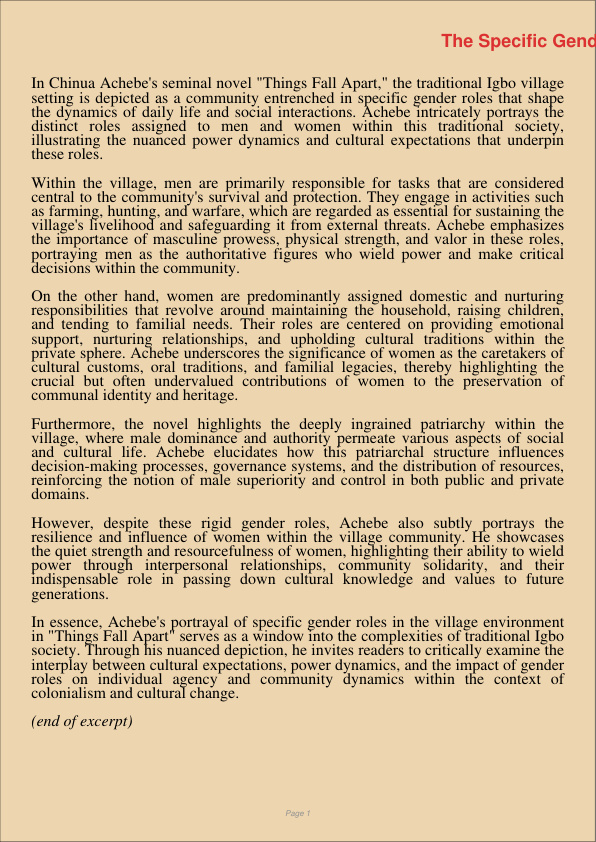The Specific Gender Roles In The Village Environment In The Novel Things Fall Apart By Chinua Achebe
Dec 31, 2023
novel things fall apart
specific gender roles
Finance & Accounting
English
In Chinua Achebe’s seminal novel “Things Fall Apart,” the traditional Igbo village setting is depicted as a community entrenched in specific gender roles that shape the dynamics of daily life and social interactions. Achebe intricately portrays the distinct roles assigned to men and women within this traditional society, illustrating the nuanced power dynamics and cultural expectations that underpin these roles.
Within the village, men are primarily responsible for tasks that are considered central to the community’s survival and protection. They engage in activities such as farming, hunting, and warfare, which are regarded as essential for sustaining the village’s livelihood and safeguarding it from external threats. Achebe emphasizes the importance of masculine prowess, physical strength, and valor in these roles, portraying men as the authoritative figures who wield power and make critical decisions within the community.
On the other hand, women are predominantly assigned domestic and nurturing responsibilities that revolve around maintaining the household, raising children, and tending to familial needs. Their roles are centered on providing emotional support, nurturing relationships, and upholding cultural traditions within the private sphere. Achebe underscores the significance of women as the caretakers of cultural customs, oral traditions, and familial legacies, thereby highlighting the crucial but often undervalued contributions of women to the preservation of communal identity and heritage.
Furthermore, the novel highlights the deeply ingrained patriarchy within the village, where male dominance and authority permeate various aspects of social and cultural life. Achebe elucidates how this patriarchal structure influences decision-making processes, governance systems, and the distribution of resources, reinforcing the notion of male superiority and control in both public and private domains.
However, despite these rigid gender roles, Achebe also subtly portrays the resilience and influence of women within the village community. He showcases the quiet strength and resourcefulness of women, highlighting their ability to wield power through interpersonal relationships, community solidarity, and their indispensable role in passing down cultural knowledge and values to future generations.
In essence, Achebe’s portrayal of specific gender roles in the village environment in “Things Fall Apart” serves as a window into the complexities of traditional Igbo society. Through his nuanced depiction, he invites readers to critically examine the interplay between cultural expectations, power dynamics, and the impact of gender roles on individual agency and community dynamics within the context of colonialism and cultural change.
